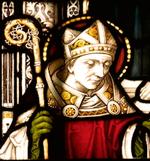Catholic Dictionary
Find accurate definitions of over 5,000 Catholic terms and phrases (including abbreviations). Based on Fr. John Hardon's Modern Catholic Dictionary, © Eternal Life. Used with permission.
Random Term from the Dictionary:
MARXISM
The social philosophy of Karl Marx (1818-83) as developed with is collaborator Friedrich Engels (1820-95) and later embodied in world Communism. There are five essential elements to Marxism, namely dialectical materialism, economic determinism, surplus value, progressive pauperization, and the Revolution.
Marx combined the dialectical method of Hegel with the materialism of Feuerbach. According to Marxism, nothing really exists but matter, which contains within itself the principle of its own development. Man is the spearhead of this necessary evolution.
Economic determinism holds that the underlying motive in all human history is economic. As the economy, so the civilization.
The workman, according to Marx, creates more value than he is paid for, and this surplus value goes to the employer, who exploits the worker to the extent. The employer puts this surplus value back into his business, and this constitutes capital. The lower the wages, the more capital for the capitalist.
As a part of his theory of economic determinism, Marx held that the rich necessarily get richer and the poor poorer. Financial crises, inseparable from the capitalist system, accentuate the degrading process.
All the foregoing are preliminary to the Marxist hope of a classless society. Capitalism must inevitably collapse; the masses will revolt, seize the means of production, establish the dictatorship of the proletariat. After a phase of state socialism there will emerge the Communist utopia where no struggles exist because all classes of society will have disappeared.
The classic position of the Catholic Church on Marxism is the encyclical of Pope Pius XI, Divini Redemptoris, published in 1937.






